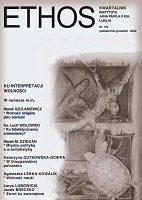O WOLNOŚCI WOLI W PSYCHOLOGII
PSYCHOLOGY AND FREEDOM OF THE WILL
Author(s): Dorota Kuncewicz, Dariusz KuncewiczSubject(s): Educational Psychology, Individual Psychology, Social psychology and group interaction, Neuropsychology, Organizational Psychology, Behaviorism, Methodology and research technology
Published by: Katolicki Uniwersytet Lubelski Jana Pawła II - Instytut Jana Pawła II, Wydział Filozofii
Keywords: free will; academic psychology; psychotherapy; methodology of sciences;
Summary/Abstract: The paper reflects on the status of free will in academic psychology and psychological practice. In contemporary academic psychology, dominated by the naturalistic model of science, the concept of free will is usually disregarded. The problem of free will was replaced by other issues (including self-regulation, self-determination, detailed goal-setting, action planning, and action control) or is discussed in terms of psychological mechanisms or illusory beliefs. In psychological practice, the original understanding of free will, embedded in philosophy and ethics, was marginalised as useless in the context of the belief in the determinism of disorders and the subjectivity of truth. The original interpretation of free will, however, is clearly present in the work of the classics of psychology and the therapeutic approach focused on analysing patients’ decisions. The return of free will and related issues to psychology is to be expected within the framework of the personalist-existentialist current, even though it now faces methodological limitations. The fi nal section proposes a way to overcome these limitations, based on the methodology of literary hermeneutics, embedded in cognitive realism, and other research approaches that take into account freedom of the human will and are relevant to psychological theory and practice.
Journal: Ethos. Kwartalnik Instytutu Jana Pawła II KUL
- Issue Year: 35/2022
- Issue No: 4
- Page Range: 225-246
- Page Count: 22
- Language: Polish
- Content File-PDF

